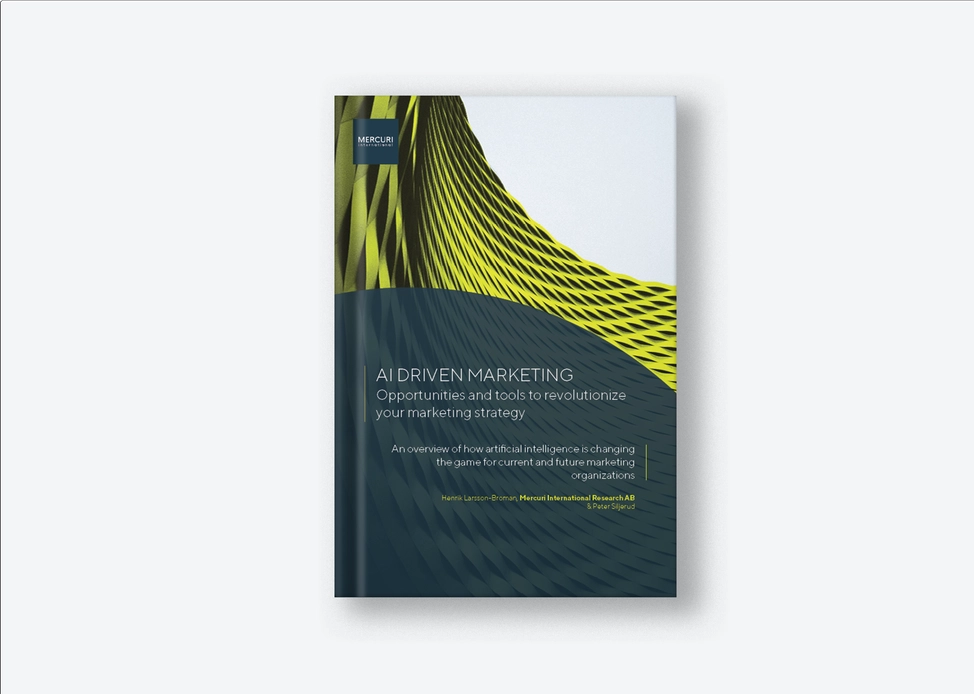Challenges and Opportunities for B2B Marketers.
In November 2022, OpenAI, a San Francisco-based company specializing in artificial intelligence (AI), launched a language model called ChatGPT. Simply put, ChatGPT is an AI-based virtual assistant, trained to handle a variety of questions and answer them in a natural and conversational way. The response was huge. After just five days, the service had reached over one million users and after two months, over 100 million people had interacted with their new assistant. This makes it the fastest growing app ever. In comparison, it took nine months for TikTok to reach the same number of users, two years for Instagram and over four years for YouTube.
That’s why Mercuri International undertook an in-depth study into all things AI. We explored best practices and investigated the myriad AI tools which AI offers marketers. With AI poised to dominate discussions in the coming years, it has become crucial for B2B marketers to understand and adapt to this paradigm shift in technology. In this blog post, we will delve into the broader AI domain, its implications for B2B marketers, and the challenges that come with harnessing its power responsibly. And for those who want to dive deeper, the entire report is available for download here.
The Evolution of AI: From Narrow to General Intelligence
At its core, AI refers to a machine’s ability to perform tasks that typically require human intelligence, such as problem-solving, learning, and decision-making. Over the past few decades, AI technology has shifted from rule-based and static systems to contemporary machine learning models, allowing computers to continuously improve their capabilities and better understand the world around them.
Nowadays, most AI solutions fall under the category of “narrow AI,” which specializes in solving particular problems and tasks. As the field evolves, however, the next stage of development is likely artificial general intelligence (AGI), or AI that can solve a broader range of problems. While AGI may provide a more human-like intelligence, its creation and impact on society remains a hotly debated topic among industry experts.
B2B Marketing in the AI Era: What now?
The adoption of AI presents ample opportunities for B2B marketers to drive efficiency, reduce costs, and refine their marketing strategies.
According to a Future State of Skills report by Mercuri International, a skills gap exists in 9 out of 10 sales and marketing organizations, largely due to the increasing complexity of sales and marketing processes, evolving buying behaviors, and rapid digitalization.
By leveraging AI, marketers can address these challenges by automating various aspects of their work, such as email marketing, targeted advertising, and customer experience optimization.
But what kind of opportunities does AI really offer to the marketer? Well, quite a few it turns out:
- Market analysis
- From assessing market size and growth to target customer segmentation
- Content production
- Not just text, but images, video, and audio, AI can supercharge creation
- Personalized marketing
- Chatbots, emails, ads, and product recommendations
- Marketing automation
- Unleash an army of bots to send targeted, personalized messaging at scale
- Lead gen and qualification
- Increase both the value and volume of leads with tools that deliver conversion
- Measuring and evaluating
- After all that, ask the question “is it working?”. And get the right answer…

Is there a downside?
However, embracing AI is not without its risks and challenges, especially when it comes to ethical and moral considerations. As AI systems collect and analyze vast amounts of customer data, businesses must ensure compliance with data protection regulations, protect customer privacy, and prevent potential misuse.
One significant ethical concern is the potential for AI algorithms to perpetuate discriminatory biases. For instance, if AI systems are trained on biased data, they could reinforce existing prejudices, resulting in skewed marketing campaigns or unfair treatment of customers. Additionally, the increasing prevalence of “deepfakes,” or synthetic images and videos generated using AI, poses a threat to public trust and the spread of misinformation.
Navigating the AI Landscape Responsibly
To harness the power of AI in B2B marketing effectively and responsibly, companies should adhere to ethical and moral principles, prioritize transparency, and consider how AI systems align with societal norms and values. By publishing AI policies and guidelines, engaging in open dialogue with customers, and regularly reporting on AI usage, businesses can foster trust and ensure that AI technology is used in a responsible manner.
Moreover, marketers should be proactive in acquiring new skills and knowledge around AI, as investing in skills development can lead to significant advancements in marketing strategies. With the right approach, AI can help bridge the skills gap, streamline marketing operations, and ultimately propel businesses to new levels of success.
The impact of artificial intelligence on B2B marketing is undeniable, presenting a wealth of opportunities for growth and innovation. However, to really take advantage of AI’s vast potential, it’s critical that businesses define a clear strategy as to how to deploy it. By understanding the challenges associated with AI and embracing ethical best practices, companies can navigate the rapidly changing landscape with confidence, ultimately unlocking new possibilities for success in the digital age.



